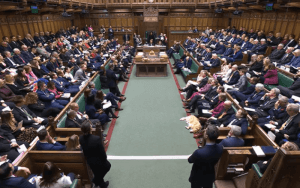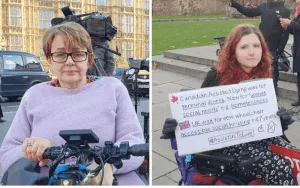Disabled activists have raised serious concerns about “toxic” and “outrageously cruel” plans to bring forward a bill to legalise assisted suicide in England and Wales.
Labour MP Kim Leadbeater announced that she would soon be introducing a bill to the House of Commons that will seek to legalise assisted suicide for those who are terminally-ill.
As she came first in the ballot to introduce private members’ bills, she will be given priority with making progress with her proposed legislation, which will be introduced on Wednesday (16 October).
This could mean MPs being given a free vote on her bill by the end of the year.
But even as Leadbeater dismissed concerns that her bill could lead to a “slippery slope”, which would see it expanded to other groups, it emerged that more than 50 cross-party MPs are already pushing for eligibility to be widened to those who are “incurably suffering”.
Opposition to Leadbeater’s bill is already mounting among disabled people.
Among them is Freya Papworth, who supported legalised euthanasia before she became disabled, and considered it “nothing more than an individual’s right to choose their own death if faced with terminal pain and suffering”.
But she added: “Now that I am disabled and have spent time with other disabled people campaigning for basic rights, I cannot support the rather euphemistic ‘assisted dying’ bill.
“This country has been found to have committed human rights abuses against its disabled population due to the terrible consequences of decades of cuts to social welfare and social care.
“There is no safety net to provide an alternative to pain and suffering and so there is not a chance that disabled people won’t be coerced into this.
“As we have seen in other countries, it is mostly disabled women – already at double the risk of domestic violence – who are ‘choosing’ to die this way and yet no-one is offering a robust solution to how we safeguard against medical and familial coercion.”
Not Dead Yet UK (NDY UK), which leads disabled people’s opposition to legalisation in the UK, said it was “deeply concerned about the upcoming debate on the private members’ bill that would legalise assisted suicide in the United Kingdom.
“While proponents argue that this legislation would provide individuals with greater autonomy and choice at the end of life, we believe it poses significant risks to disabled people and other vulnerable populations.”
Among its concerns, NDY UK pointed to the risk of “coercion and pressure on disabled individuals to end their lives prematurely”; the impossibility of ensuring watertight safeguards; the need instead to focus on provision of universal access to high-quality palliative and social care; and how legalisation would “undermine trust in the doctor-patient relationship, particularly for disabled individuals and others who already feel their lives are undervalued by society”.
NDY UK also warned of the “slippery slope” argument, as several other states and countries that have introduced assisted suicide initially only for those who were terminally-ill have later expanded it to allow it for people “with chronic illnesses, disabilities, anorexia and mental health conditions”.
Dr Miro Griffiths, co-director of the Centre for Disability Studies at the University of Leeds, although not speaking for the centre, said: “Any bill that proposes assisted suicide remains toxic and detrimental to the realisation of accessible and inclusive societies.”
Griffiths, speaking on behalf of the Better Way campaign, which opposes legalising assisted suicide, said Leadbeater could have used the opportunity of coming top of the ballot to try to improve provision of palliative care and hospice resources.
Focusing on assisted suicide instead, he said, would “further compound inequalities experienced by disabled people’s communities and individuals with health conditions.
“It will, also, destabilise approaches to suicide prevention.
“The state should never have a role in facilitating and – arguably – accelerating one’s death.”
The disabled people’s organisation Buckinghamshire Disability Service (BuDS) called on Leadbeater to withdraw her bill once it has had its first debate in the Commons, so there can be a Royal Commission on assisted suicide before any legislative changes are considered.
Andrew Clark, chair of BuDS, said: “As things stand, BuDS on behalf of disabled people strongly opposes any change to the law around assisted suicide.
“What we are seeing is a rush to change the law driven entirely by a multi-million-pound lobbying campaign by two or three organisations with a very strong ideological commitment to assisted suicide.
“Social media is full of slick statements; assisted suicide lobbyists attended all the party conferences; and MPs are being bombarded with campaign letters supporting assisted suicide.
“This is not the way to make a profound and difficult change to the law on murder and assisted suicide.”
He added: “BuDS, like many other organisations, demands a more thorough and comprehensive examination of all the issues around assisted suicide, and proper research into how people feel about it.
“The views of disabled people, who are most likely to be the victims of assisted suicide, have to be clearly heard and given due weight.”
Others expressing their opposition have included disabled Labour MP Marsha de Cordova, who said on Twitter: “Disabled activists urge Parliament to vote against the Assisted Dying Bill.
“Their real and legitimate fears must not be ignored.”
Disabled actor-activist Liz Carr, whose critically-acclaimed documentary about assisted suicide, Better Off Dead?, was broadcast on BBC1 in May, said on Twitter: “I made my BBC documentary Better Off Dead? to explain why me and many other disabled people oppose legalising assisted suicide.
“Some of us have very real fears based on our lived experience and based on what has happened in other countries where it’s legal.”
Disabled People Against Cuts also attacked the idea of the bill on Twitter, saying that pushing such legislation before the new Labour government had even talked publicly about disabled people and disability benefits was “outrageously cruel”.
And disabled journalist and author Lucy Webster said on Twitter: “Labour might want to think about the fact that the first thing it’s doing about disabled people is debate whether the state should be allowed to help us die.”
Last month, Labour’s health and social care secretary Wes Streeting said he did not believe that end-of-life care in England and Wales was good enough that terminally-ill people would not feel “coerced by the lack of support available” if assisted suicide was legalised.
Meanwhile, politicians in Scotland, Jersey and the Isle of Man are also considering legalising assisted suicide.
A note from the editor:
Please consider making a voluntary financial contribution to support the work of DNS and allow it to continue producing independent, carefully-researched news stories that focus on the lives and rights of disabled people and their user-led organisations.
Please do not contribute if you cannot afford to do so, and please note that DNS is not a charity. It is run and owned by disabled journalist John Pring and has been from its launch in April 2009.
Thank you for anything you can do to support the work of DNS…

 Disabled activists pledge to continue to fight assisted suicide bill, after MPs vote in favour
Disabled activists pledge to continue to fight assisted suicide bill, after MPs vote in favour Majority of disabled MPs voted against assisted suicide bill, figures show
Majority of disabled MPs voted against assisted suicide bill, figures show Assisted suicide vote will make other campaigning tougher, say activists
Assisted suicide vote will make other campaigning tougher, say activists